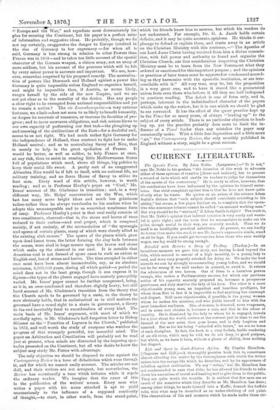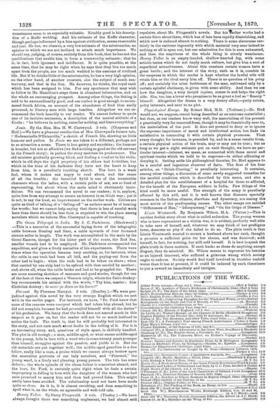Life and Sport in South-Eastern Africa. By Charles Hamilton.
(Chapman and Hall.)-1 thoroughly genuine book this is, sometimes almost offending the reader by the thoroughness with which the writer enters into the savage life which ho describes, and by its appearance of rebellion against civilization. We say " writer," but Mr. Hamilton has not condescended to earn that title; he has allowed his friends to take
down his narratives of travel and hunting and to give them to the public.
They are quite worth the trouble. It is evident that few men see so much of the countries which they describe as Mr. Hamilton has done ; among other things, he made himself into a Kaffir, donned the buffalo robe, with what may be described as an under-clothing of red paint. The observations of life and manners which he made under these dr-
cumstances seem to us especially valuable. Notably good is his descrip- tion of a Kaffir wedding. And his estimate of the Kaffir character, though perhaps influenced by a bias against civilization, seems reasonable and just. He has, we observe, a very low estimate of the missionaries, an opinion to which we are not inclined to attach much importance. We should say, judging, of course, entirely from this book, that he has not the qualifications that enable him to form a trustworthy estimate ; that he is, in fact, both ignorant and indifferent. It is quite possible, at the same time, that he may be right when he says that they live too much apart from the people, are too much wedded to the customs of civilized life. But if he thinks little of the missionaries, he has a very high opinion, on the other hand, of another creature, also the subject of much con- troversy, and that is the lion. He deserves, he thinks, the royal rank which has been assigned to him. For any sportsmen that may wish to follow in Mr. Hamilton's steps there is abundant information, and on the whole an encouraging prospect. Among other things, the fishing is said to be extraordinarily good, and our author is good enough to recom- mend South Africa, on account of the abundance of food thus easily procured, to literary men with large families. Altogether we can re- commend the book heartily to our reader. We cannot forbear to quote one of its incisive sentences, a description of the mental attitude of a Coolie: "he believes in nothing, cares for nothing, and fears everything."



































 Previous page
Previous page